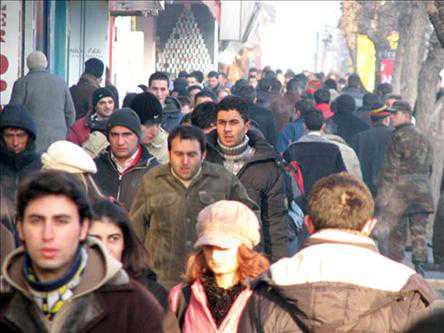Turkish Government Under Fire for Delaying Response to the Global Financial Crisis
Publication: Eurasia Daily Monitor Volume: 6 Issue: 32
February 18, 2009
By: Saban Kardas
An announcement of recent economic indicators on Monday by the Turkish Statistical Institute (TUIK) has revealed that the number of unemployed people rose by 645,000 over the previous year, reaching 2.99 million in the period from September through November 2008. This represents an increase in the unemployment rate from 10.1 percent during the same period of 2007 to 12.3 percent in 2008. While the unemployment rate in rural areas was only 9.3 percent, it reached 14.2 percent in urban areas, and was 23.9 percent among the youth. The number of employed people reached 21,315,000, marking a 448,000 increase over the previous year. Of the entire pool of unemployed, around 72.6 percent were men, and about 59.4 percent did not have a high school diploma. Some 26.6 percent had been seeking employment for more than a year (Hurriyet Daily News, February 17, www.turksat.gov.tr).
Rising unemployment, reaching the highest level since 2005, has brought attention to the Justice and Development Party’s (AKP) handling of the Turkish economy and whether it has taken the necessary precautions to weather the global financial crisis. Critics believe that unemployment figures are only one indication of how the government has failed to comprehend the depth of the crisis and formulate prompt responses. Indeed, earlier economic data released by the TUIK appear to lend support to the critics. At the end of last year TUIK announced that the economic growth rate had dropped to 0.5 percent in the third quarter of 2008 and would continue to decline in the last quarter (Sabah, December 16). Similarly, the country’s industrial production output declined in December by 17.6 percent on a year-to-year basis (Cihan Haber Ajansi, February 9). To make matters worse, the industrial capacity utilization rate dropped to 63.9 percent in January, marking its lowest level in the past 18 years (Radikal, February 11). Moreover, according to the Turkish Employment Organization (IS-KUR), the number of people looking for a job rose by 95 percent in January compared with the previous year, reaching 151,530 (Radikal, February 13).
According to its critics, the government was slow to recognize that the global recession would inevitably result in the contraction of the Turkish industrial sector and result in unemployment. According to Mustafa Boydak, the head of Chamber of Industry in Kayseri, one of Turkey’s industrial centers in Anatolia, there were already signs of the crisis in the first half of 2008 and business circles had clearly explained the situation to the government, providing adequate warning. The lack of communication between Prime Minister Recep Tayyip Erdogan and economic managers, however, prevented a candid assessment of the crisis on the part of politicians, and Turkey fell behind other countries that have taken measures to assuage the economic calamity. Boydak cites three factors bedeviling the industrial sector: an inability to procure loans at reasonable conditions; difficulties with exports; and contraction of the domestic market (Referans, February 16; Hurriyet Daily News, February 17).
On February 15 major Turkish unions and vocational organizations organized a joint meeting in Istanbul to protest economic policies. In a rally entitled “We Will Not Pay the Price of the Crisis,” workers and public employees called on the government to introduce policies to address the rising unemployment immediately (Anadolu Ajansi, February 15).
Following the announcement of official unemployment rates, the Turkish Confederation of Employers’ Unions (TISK) issued a statement calling on the government to take preventive measures. TISK claimed that among developing countries Turkey ranked near the top in terms of decline in industrial production and growth rate and in increasing unemployment. Based on the recently released figures, TISK believes that Turkey is one of the hardest hit countries by the economic crisis and that unless the government acts quickly to introduce a package to stimulate demand and solve financing problems, the situation might become even worse (Anadolu Ajansi, February 16).
For its part, the AKP government does not seem to be alarmed by the recent economic figures. Speaking to the NTV news station, Industry and Trade Minister Zafer Caglayan said that the rise in unemployment had been anticipated and that if the government had not taken precautions in 2008, the numbers would have been even higher. Noting that the government expected the crisis to influence the Turkish economy for the next six to seven months, Caglayan assured the market that the government had a plan of action. Despite the repercussions of the crisis in the real sector, the financial sector was not as badly hit as in other countries, and this was to Turkey’s advantage. He especially rejected calls to introduce an “economic package” simply because other countries were doing so, and added that Turkey would deal with the crisis by taking its own unique conditions into account, echoing Erdogan’s oft-repeated argument that Turkey will handle the crisis according to its national interests. Caglayan also announced forthcoming measures to stimulate the automotive and textile industries (www.ntvmsnbc.com.tr, February 16).
Indeed, the government has already forwarded the first concrete package to the Turkish parliament. After approval by the Planning and Budgetary Commission, the parliament began debating the package on February 17. The main goal of the package, which includes short- and mid-term measures to address the economic crisis, is to stimulate employment (ANKA, February 17).
The government is also under pressure for delaying the conclusion of a loan with the International Monetary Fund (IMF), and critics believe that this is mainly because of short-term political considerations in anticipation of forthcoming local elections. The government, on the other hand, argues that the IMF conditions would have limited Turkey’s flexibility in dealing with the crisis, perhaps even exacerbating the problems in unemployment and growth (www.ntvmsnbc.com.tr, February 16). In the meantime, Turkey and the IMF have taken a break from negotiations to clarify their positions on the remaining points of disagreement (EDM, January 29). Despite the Turkish side’s assertion that there has been progress in negotiations, it is still unclear when an agreement might be reached (www.cnnturk.com, February 17).
Although the AKP government believes that it is doing everything to manage the global crisis on the basis of Turkey’s national interests, the market has grown increasingly anxious about the government’s delay in implementing efficient measures. It is hoped that the economic stimulus package and a deal with the IMF, should there be one, will not be too little, too late.
https://jamestown.org/program/turkish-government-under-fire-for-delaying-response-to-the-global-financial-crisis/





